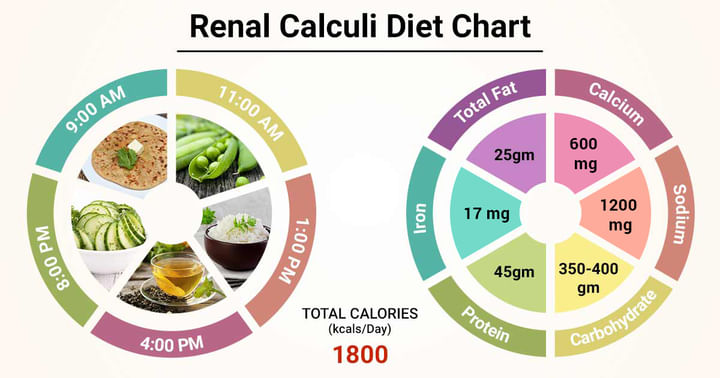Get the App
For Doctors
Login/Sign-up
About
Health Feed
Find Doctors
Diet Chart For renal calculi
Last Updated: Apr 10, 2024
About
Renal Calculi is the plural for Renal Calcus which, otherwise, means Kidney Stone. Development of the stones is related to decreased urine volume or increased excretion of stone-forming components such as calcium, oxalate, urate, cystine, xanthine, and phosphate. The process of stone formation is also called nephrolithiasis or urolithiasis. "Nephrolithiasis" is derived from the Greek nephros (kidney) + lithos (stone) = kidney stone.
The patient needs to have a sufficient renal calculi diet that includes:
- Drink water throughout the day. For people with a history of kidney stones, doctors usually recommend passing about 2.6 quarts (2.5 liters) of urine a day. During summers or when a there is dry climate drink even more water to produce enough urine. If urine is light and clear, then the amount of water consumption is perfect.
- Eat fewer oxalate-rich foods. If there is formation of calcium oxalate stones, avoid foods rich in oxalates. These include rhubarb, beets, okra, spinach, Swiss chard, sweet potatoes, nuts, tea, chocolate, black pepper and soy products.
- Choose a diet low in salt and animal protein. Reduce the amount of salt and choose protein sources, such as legumes. Consider using a salt substitute.
- Continue eating calcium-rich foods, but use caution with calcium supplements. Calcium in food doesn't have an effect on kidney stones.
Diet Chart
| Sunday | |
| Breakfast (8:00-8:30AM) | 2 paratha(aloo/gobhi/methi) with 2 tsp green chutney+1 glass milk(toned) |
| Mid-Meal (11:00-11:30AM) | 1 medium size pea |
| Lunch (2:00-2:30PM) | 1 cup rice+2 roti+brinjal sabji+1/2 cup rasam+1 glass buttermilk |
| Evening (4:00-4:30PM) | 1 cup green tea+2-3 biscuits |
| Dinner (8:00-8:30PM) | 3 bajra roti+lauki methi curry+1/2 cup cucumber salad |
| Monday | |
| Breakfast (8:00-8:30AM) | 3 uthappam+2tsp methi chutney+1 glass milk(toned) |
| Mid-Meal (11:00-11:30AM) | 100gm musk melon |
| Lunch (2:00-2:30PM) | 4 jowar roti+ 1/2 cup bitter gourd sabji+1/2 cup french beans curry+1 glass buttermilk |
| Evening (4:00-4:30PM) | 1 cup green tea+2-3 biscuits |
| Dinner (8:00-8:30PM) | 3 roti+1/2 cup colocasia(arbi) curry+1/2 cup cucumber salad |
| Tuesday | |
| Breakfast (8:00-8:30AM) | 1 cup bajra upma with vegetables+1 glass milk(toned) |
| Mid-Meal (11:00-11:30AM) | 100gm pomegranate |
| Lunch (2:00-2:30PM) | 1 cup rice+2 roti+1/2 cup rasam+1/2 cup capsicum sabji |
| Evening (4:00-4:30PM) | 1 cup green tea+2-3 biscuits |
| Dinner (8:00-8:30PM) | 3 jowar roti+1/2 cup raw banana curry+1/2 cup cucumber salad |
| Wednesday | |
| Breakfast (8:00-8:30AM) | Vegetable sandwich with 4 whole wheat bread slices+cucumber,tomato, onion,spinach/lettuce+1 glass milk(toned) |
| Mid-Meal (11:00-11:30AM) | 100 gm of pineapple |
| Lunch (2:00-2:30PM) | 1 cup rice+2 roti+1/2 cup rasam+1/2 cup ivy gourd(parmal) sabji+1 glass buttermilk |
| Evening (4:00-4:30PM) | 1 cup green tea+2-3 biscuits |
| Dinner (8:00-8:30PM) | 3 roti+1/2 cup tinda curry+ 1/2 cup cucumber salad |
| Thursday | |
| Breakfast (8:00-8:30AM) | 3 rice dosa+1/2 cup sambhar(less dal)+1tsp methi chutney+1 glass milk(toned) |
| Mid-Meal (11:00-11:30AM) | 1 banana |
| Lunch (2:00-2:30PM) | 4 bajra roti+1/2 cup methi sabji +1/2 cup mooli curry+1 glass buttermilk |
| Evening (4:00-4:30PM) | 1 cup green tea+2-3 biscuits |
| Dinner (8:00-8:30PM) | 3 bajra roti+ 1/2 cup ridge gourd(thori) curry+1/2 cup cucumber salad |
| Friday | |
| Breakfast (8:00-8:30AM) | 4 rice Idly+ 1/2 cup sambhar(less dal)+1 tsp coconut chutney+1 glass milk(toned) |
| Mid-Meal (11:00-11:30AM) | 1 medium size orange |
| Lunch (2:00-2:30PM) | 1 cup rice+2 roti+1/2 cup rasam+1/2 cup cabbage sabji+1 glass buttermilk |
| Evening (4:00-4:30PM) | 1 cup green tea+2-3 biscuits |
| Dinner (8:00-8:30PM) | 3 roti+1/2 cup bhindi curry+1/2 cup cucumber salad |
| Saturday | |
| Breakfast (8:00-8:30AM) | 1/2 cup cornflakes in 1 glass milk(toned) |
| Mid-Meal (11:00-11:30AM) | 1 medium size guava |
| Lunch (2:00-2:30PM) | 1 cup rice+2 roti+1/2 cup snake gourd sabji+1/2 cup rasam+1 glass buttermilk |
| Evening (4:00-4:30PM) | 1 cup green tea+2-3 biscuits |
| Dinner (8:00-8:30PM) | 3 jowar roti+1/2 cup cauliflower curry + 1 cup cucumber salad |
Food Items To Limit
- Limit Animal Protein: Foods highest in purines include organ meats, such as liver, heart and kidney; anchovies; sardines; mackerel; codfish; herring; mussels; scallops; shrimp; veal; bacon.
- Avoid Sodium: Sodium may increase your risk of calcium oxalate and phosphate stones by causing your kidneys to excrete more calcium in the urine.
- Avoid Oxalate & Vitamin C: Limit the oxalate in your diet if you are at risk for calcium oxalate stones. High-oxalate foods include spinach, beets, rhubarb, nuts, wheat bran, buckwheat and chocolate.
- Stone Promoting Fluids: Avoid sodas altogether to help reduce recurrence of stones. Drink mostly water and aim to consume between eight to 12 cups of fluid per day.
- Foods High in Potassium: Kidney patients are advised to limit foods that are high in potassium, as these may lead to life-threatening complications such as heart failure. Tomato, potato, spinach, avocados, banana, orange and dried fruits should be limited.
- Caffeine and Alcohol: You need to limit caffeine and alcohol, they may initially increase urine output, but deplete your body water.
Do's And Dont's
Do's:
- Drink sufficient water/juices to excrete more than
- 5-2 liters of urine per day.
- Reduce consumption of protein food to a judicious level, as diet high in protein (e.g., meat fish, pulses, nuts and eggs) may lead to kidney stones.
- Decrease the consumption of sugar (e.g., sucrose)as sugar also promotes stone formation.
- Consume adequate amount of calcium every day. You can get enough calcium from food items like milk (120mg/100g), yogurt (120 mg/100g) and cheese (700mg/100g) reducing calcium intake may not decrease risk of stone formation but can lead to osteopenia.
- Daily consume raw fruits such as melons, papaya, grapes, bananas, etc. in large quantity as they provide water soluble fiber.
- Be active and exercise regularly to lose your weight, which may be helpful to flush out better and maintain healthy functioning kidneys.
Don'ts:
- Avoid drinking a lot of coffee/tea and alcoholic beverages.
- Avoid too much drinking of carbonated drinks, sports drinks and sodas etc.
- Avoid highly salted (e.g., canned food, ready to eat food snacks, etc.) or sugared foods. High salt intake increases the level of calcium in urine and hence increases the risk of stone formation.
- Avoid oxalate containing foods including nuts, black tea, green leafy vegetables, soya and chocolates.
Food Items You Can Easily Consume
- Cereals: Brown rice, Oat meal, Brocken wheat, Ragi, Quinoa.
- Pulses: Chickpeas, Kidney beans, moong dal, masoor dal, soybeans.
- Vegetables: All gourds-bitter gourd, snake gourd, ridge gourd, bottle gourd, ivy gourd, ladies finger, tinda,green leafy vegetables.
- Fruits: Custard Apple, Pears, Grape and Watermelon, Orenges and Apple.
- Milk and Milk products: Skim milk, Paneer, Cotage Cheese, Yoghurt.
- Meat, Fish and Egg: Lean Meat, skin out chicken, Tuna, Salmon.
- Oil:
- 5 Tbsp/ day( Olive oil, Rice bran Oil, Canola oil
- Sugar: 1 Tsp/ day.
References
- Heilberg IP. Update on dietary recommendations and medical treatment of renal stone disease. Nephrology Dialysis Transplantation. 2000 Jan 1;15(1):117-23.
- Trinchieri A. Diet and renal stone formation. Minerva medica. 2013 Feb;104(1):41-54.
- Trinchieri A, Mandressi A, Luongo P, Longo G, Pisani E. The influence of diet on urinary risk factors for stones in healthy subjects and idiopathic renal calcium stone formers. British journal of urology. 1991 Mar;67(3):230-6.
Book appointment with:
Delhi
Mumbai
Chennai
Bangalore
Index
Table of content
Content Details
Written ByDrx Hina FirdousPhD (Pharmacology) Pursuing, M.Pharma (Pharmacology), B.Pharma - Certificate in Nutrition and Child CarePharmacology
Reviewed By
Find Dietitian/Nutritionist near me
Ask a free question
Get FREE multiple opinions from Doctors
posted anonymously



